Dementia is a heart-breaking condition that many families have to struggle with. Children’s librarian Bee Trudgeon puts together a list of books that can help our tamariki understand and manage being around someone with dementia.
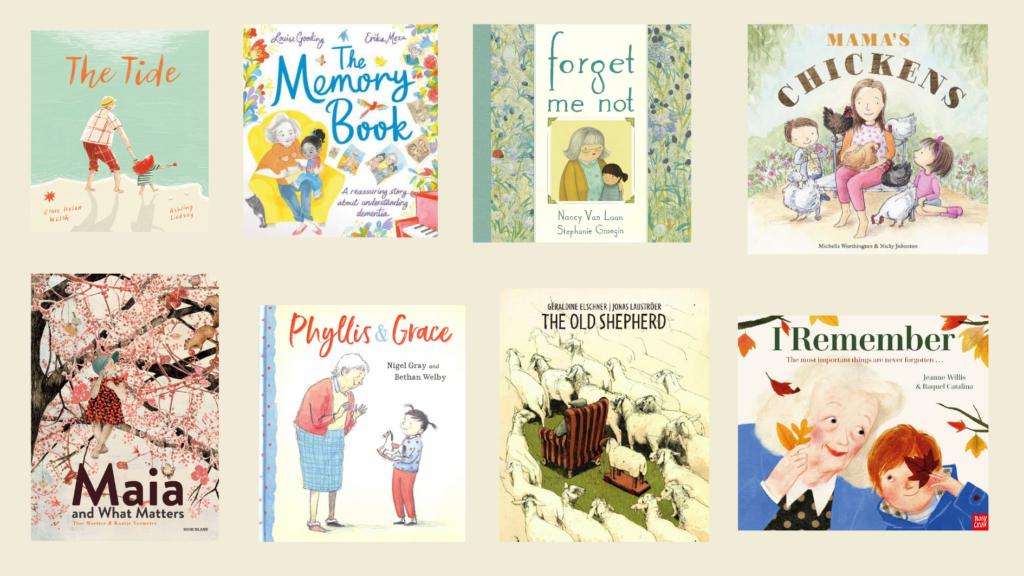
I recently came across a very silly book about dementia (which I won’t be reviewing here) which made me realise how important a list of good books written for children about the subject would be. My whānau has extensive lived experience of caring for a dementia patient, and it has been a spectacularly difficult row to hoe. So, let’s start with a few things I know about dementia, which I don’t want to see in books. Dementia – mate wareware – does not rhyme, and it is hard to draw any reason from. Dementia is not even remotely funny. Dementia is not cute, or pretty, or sentimental. Although it might be able to be managed, dementia doesn’t get better – even with medication.
Dementia is progressive, the changes typically spreading through the brain, and the symptoms growing worse. Whatever kind of dementia a person has, their life expectancy is generally lower. In her book What Dementia Teaches Us About Love, Nicci Gerard paints a picture of ‘a journey into the dusk and then the darkness, and then out on to the other side, where, once someone is dead, a life can be seen whole again.’ Withstanding the trip is hard work for the unwittingly blinded driver, and any passengers holding on to what’s left of them.
Younger participants might find the condition absolutely unfathomable; a monstrous thief of grandparents, and great-aunts and uncles. Dementia’s demanding tentacles may also have wrapped themselves around their parents, increasingly consumed with meeting the needs of the ones who once met theirs, leaving less attention to spare for ngā tamariki. This list is for the ones who need to see they are not alone on this journey into darkness.
Picture Books
The Tide, by Clare Helen Welsh, illustrated by Ashling Lindsay
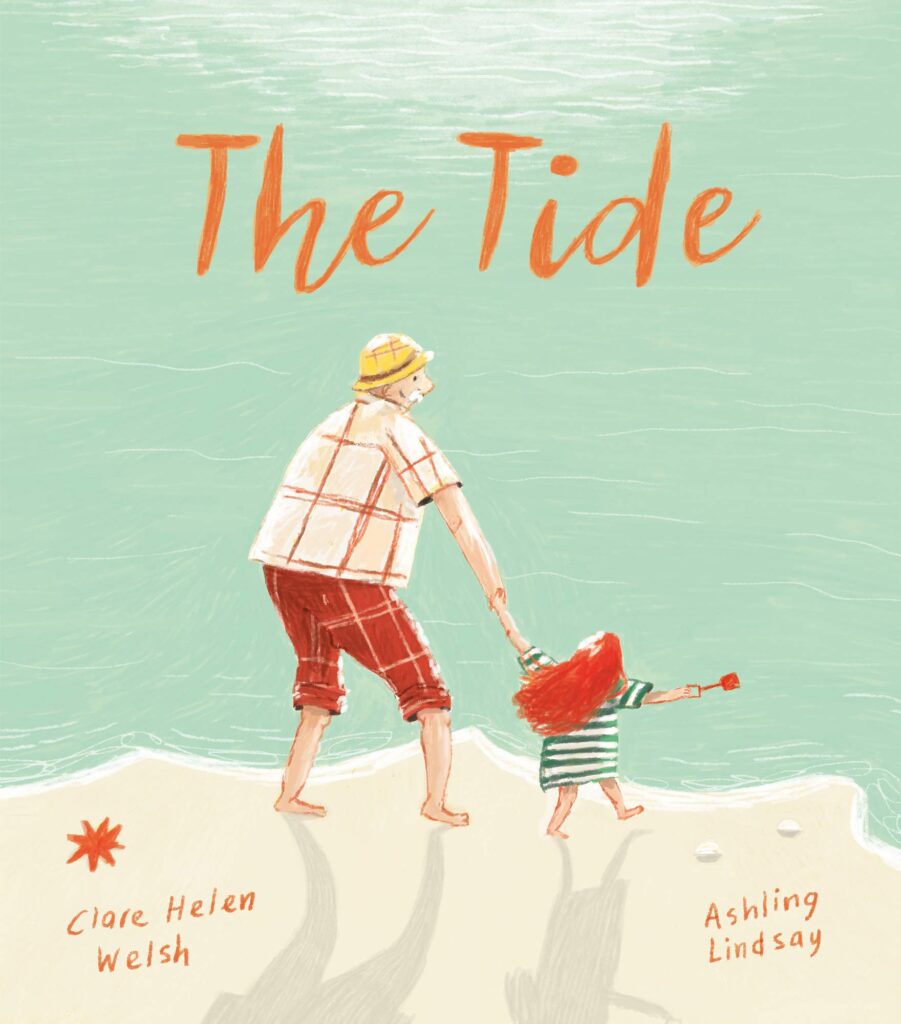
Dementia alters many facets of a relationship, but the need for love and affection remains constant. This comforting picture book for the youngest readers acknowledges a child’s frustrations, tempering them with the knowledge that ‘it must be scary to forget’, comparing them to times when she herself has forgotten things as a route to empathy. It’s not the only book to use the example of how to tie one’s shoes being tricky to remember in the early stages of its repetition (see also The Memory Book below). The non-nuclear shape of this family – grandfather, mother and daughter (naturally presented and not explicitly explained) – is also comforting, suggesting dementia does not only play out in fully-resourced families (and, again, we see this in The Memory Book). Patience, rhythm, repetition of favourite experiences, and love are presented as the most important tools for living with cognitive decline.
The Memory Book: a reassuring story about understanding dementia, by Lousie Gooding, illustrated by Erika Meza
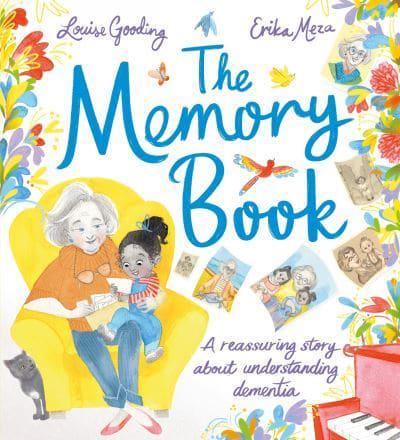
Photographic trips down memory lane can provide a positive experience for those living with dementia. Even if they cannot join in conversationally, they can still gain pleasure from involvement in reflections of their past. A biracial family of grandmother/mother-in-law, daughter-in-law/mother, and daughter/grand-daughter use this device to help Grandma when dementia changes her behaviour, unsettling both her and her granddaughter.
Resources in the back of the book highlight the practices of labelling photographs and everyday objects to trigger recollection. The photo album design flows from the endpapers into the story (my only criticism being that they are repeated, as I was very involved in attempting to make my own connections between the members of the story, and would have loved to make more). This is a really soulful, helpful, and aesthetically pleasing picture book.
Forget Me Not, by Nancy Van Laan, illustrated by Stephanie Graegin
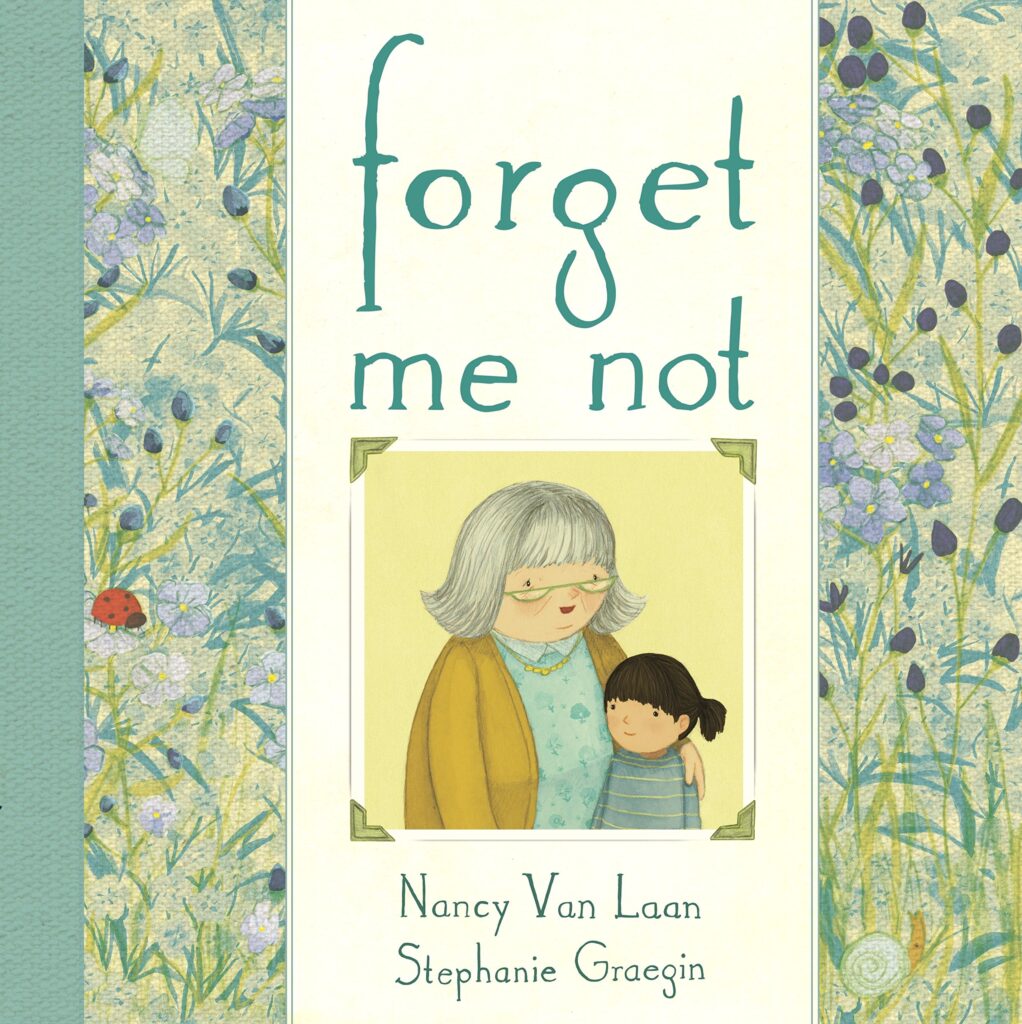
Shared metaphors ripple across dementia stories. This book sees the ocean tide again referenced (see aforementioned The Tide): ‘…ever so slowly, like a low tide leaving the bay, a change came along. Grandma was becoming more and more forgetful.’ Nothing gets by her grand-daughter Julia – the narrator of Grandma’s decline – from seeing Grandma go from sweet and particular, to dotty, to forgetful and erratic, all the way to her eventual residence in a care facility. The fact that Grandma no longer remembers who Julia is does not dim the child’s affection for her, and the child dreams of a season soon when her actions will return the old woman’s abilities. It’s a comforting arc to a book which pulls few punches, touching on real world challenges, such as frequent phone calls from neighbours, and highly public incidents. It’s nice to remember that remembering works two ways.
I Remember, by Jeanne Willis, illustrated by Raquel Catalina
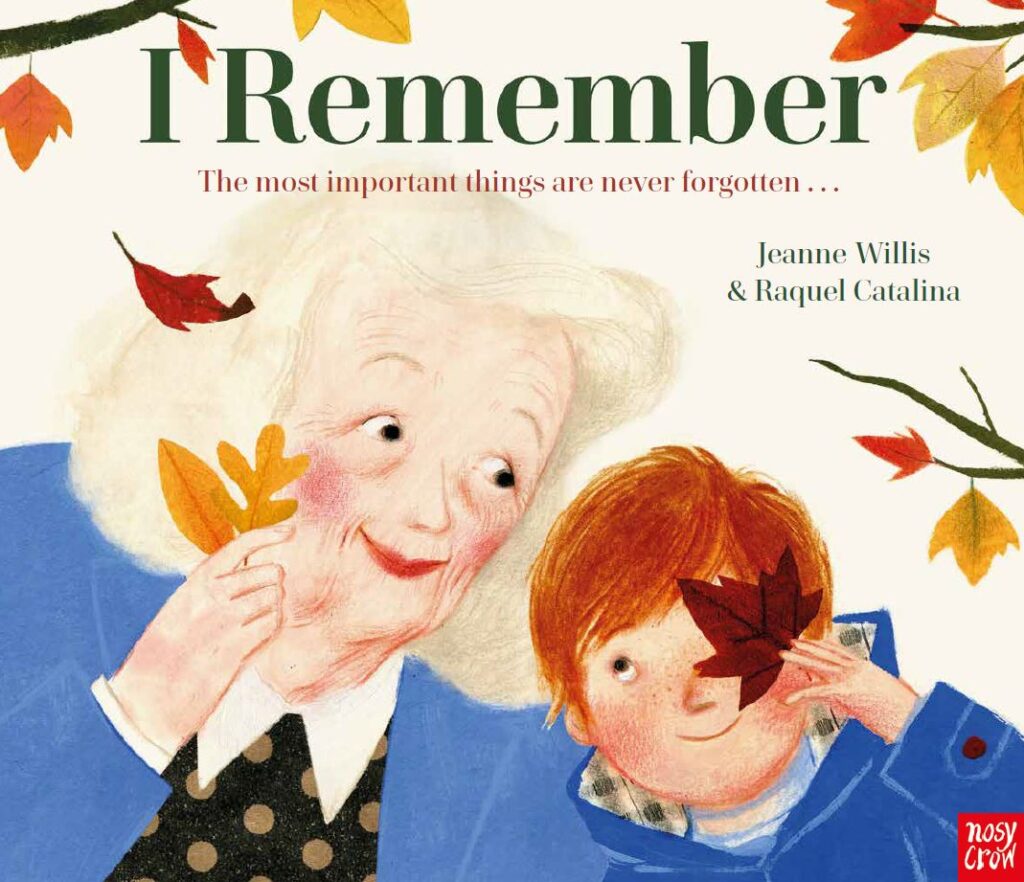
This is another masterful work by the incomparable Jeanne Willis, whose prodigious output covers so many of the important relational challenges we deal with. It’s relatable and realistic, focussing tightly upon its sole characters, George and his deliciously wrinkly Grandma. George’s imagination populates the empty spaces in Grandma’s memory perfectly, and there’s immense comfort in questions being answered like:
“Who am I?” said Kathleen.
“An astronaut,” said the boy.
And – when Kathleen is left on her spaceship bench a moment too long:
“Help! Help! Where am I?”
“Do not be afraid!” said the boy [swinging into the frame]. “I have come to rescue you from the aliens.
The book is largely dialogue, but takes its hopeful closing note from George’s internal certainty that – ‘even if Grandma’s mind forgot who he was… her heart always remembered.’
Mama’s Chickens, by Michelle Worthington, illustrated by Nicky Johnston
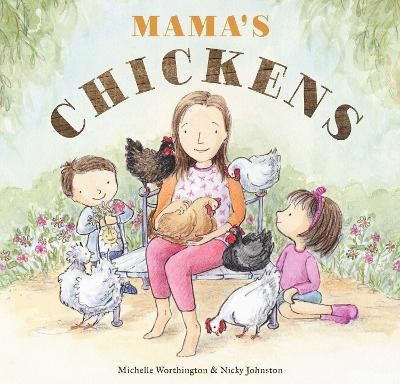
This sensitive and important work deals with younger onset dementia, tenderly blurring the line between a mother’s care for her chickens, and her two small children, when she begins to lose her memory. It’s a beautiful book on a topic I’ve not seen covered before, acknowledging the inherent challenges in needing to be cared for oneself, while still being a caregiver for others.
Phyllis and Grace, by Nigel Gray, illustrated by Bethan Welby
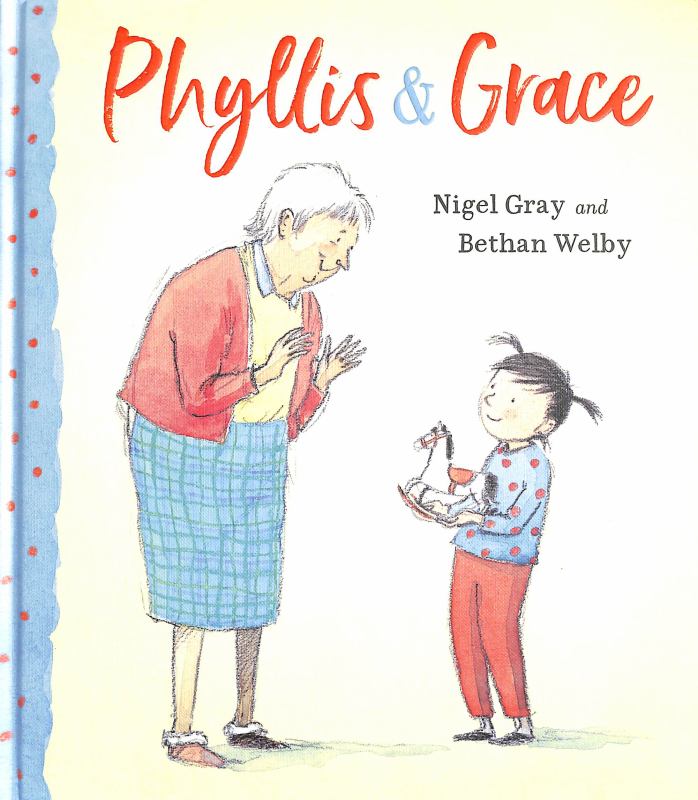
The provision of food – a gesture of neighbourly care and support – prompts each visit unquestioning young Grace makes to her elderly neighbour, an empty nest widow named Phyllis.
Inside Phyllis’s house, it is clear she is not managing her basic care well. Sour milk is poured in the kettle to make tea, cake given one day is served again – mouldy – days later.
“You must think I’m silly,” says Phyllis, feeling sad at one point, in a moment of confusion.
“No, I don’t,” Grace replies.
When Phyllis moves into an old people’s home, enduringly faithful and patient Grace is often mistaken for a daughter or granddaughter.
‘Grace didn’t mind. Phyllis always liked Grace whoever she thought she was.’
Again, the girl’s equanimity is a teacher, reminding us that correction, contradiction, and blame are never necessary and often unhelpfully cruel, reminding the disabled person how inhibited they are. It is much kinder to allow and forgive, again and again.
Sophisticated Picture Books
The Old Shepherd, by Géraldine Elschner, illustrated by Jonas Lauströer
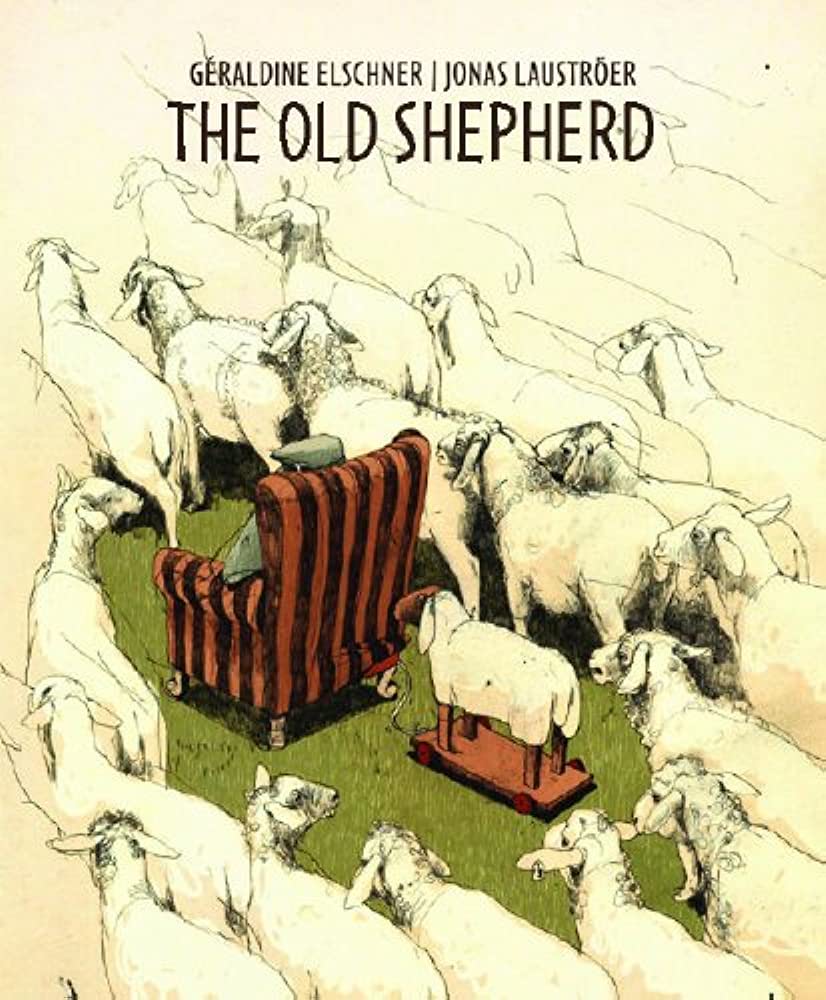
The front endpapers of this book suggest the wool the mind of a dementia patient finds constantly pulled over their eyes. Upon zooming out, we discover this wool is an integral part of the narrative.
Otto Grimm is a terrifying presence at the nursing home where Anton visits his Grandpa every Wednesday. Otto was a shepherd before being confined to the rest home’s quarters, and finds it hard to live, ‘cooped up inside, in the middle of this big herd of old sheep…’
This gives Anton a great idea, regarding a passion he shares with Mr Grimm. The following week, when he brings a toy sheep on wheels to visit, Mr Grimm is astonished, speaking about it in an ‘almost cheerful’ voice the nurses can hardly believe. What follows is an ingenious adjustment and addition to the rest home’s garden, making it a place Mr Grimm can become his best self again.
This text touches on two important aspects of dementia care – reminiscence, and tactile sensation. Reminiscence leads Mr Grimm towards a feeling of competence and confidence, by reconnecting him with a previously mastered skill. While petting the toy sheep, his sense of touch helps trigger memories of days he once had the competence to control.
Maia and What Matters, by Tine Mortier, illustrated by Kaatje Vermeire
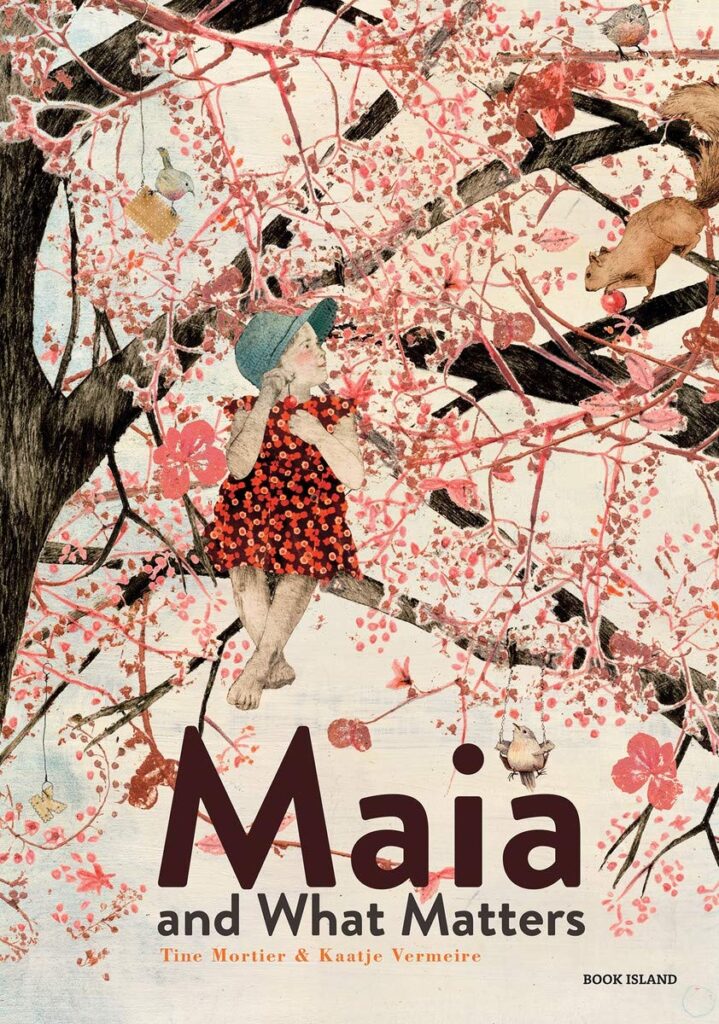
This peerless sophisticated picture book tells a highly relatable story about how the bond between a vibrant grandmother and her spunky grand-daughter endures vascular dementia, and then the death of their beloved husband/grandfather. It is a book as full of life – from text to intricate collage illustrations – as it is reflective upon loss. It presents irresistible Maia as a hero of her grandmother’s life, when she insists upon facilitating a final goodbye between Grandma and Grandpa, despite the insistence of a horde of terrifying-looking nurses that this is not possible. Maia clearly understands that being involved in the arrangements that follow a death can help a person with dementia accept the fact of loss, and begin to grieve. ‘How incredibly beautiful,’ indeed.
Kaatje Vermeire’s highly symbolic illustrations – mixing digital and handmade media in collage – earned her the Grand Prize at the Picturale Competition in Ronse in 2010. They make this a book to pore over, time and time again, rewarding with the discovery of multiple aspects of its protagonists’ personalities, rendering them as unforgettably believable characters.
While this list focuses on the picture and sophisticated picture book format, you can find non-fiction books about dementia at Dewey number 616.83 of your library. Two of my favourite older fiction/teen novels centring upon characters with dementia are New Zealand publications – Margaret Mahy’s excellent Memory; and Kate De Goldi’s beloved The ACB With Honora Lee, featuring stylishly timeless illustrations by Gregory O’Brien. Both immerse us more deeply into contrasting young people’s views of how dementia is lived and perceived quite differently, depending on social circumstances and support. Nevertheless, as the protagonist of Memory, teenage Jonny, muses:
No doubt the world was full of hands being held out, one way or another, and once your own had been taken, you were obliged to pass the help on.

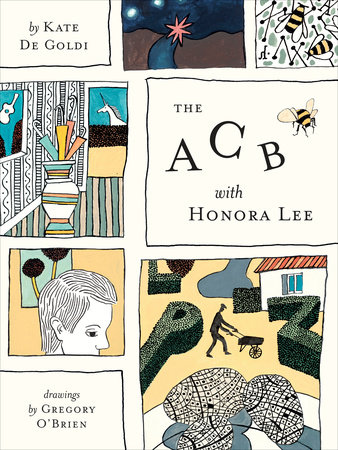

Bee Trudgeon
Bee Trudgeon is a children’s librarian, writer, strummer, storyteller, dancer in the dark, film buff, perpetual student, and mother of two study buddies. Often spotted urban long-distance walking wearing headphones and a ukulele, she lives in a haunted house in Cannons Creek, and works in Porirua and wherever anyone will have her.



